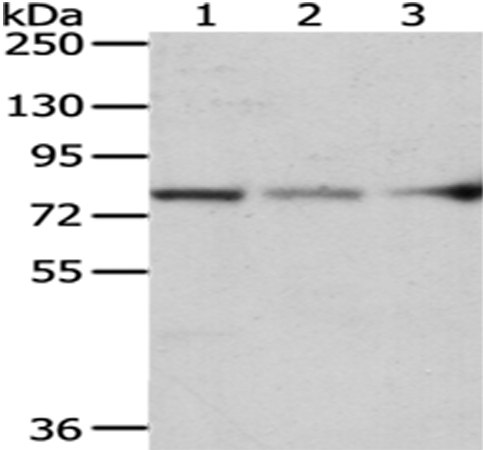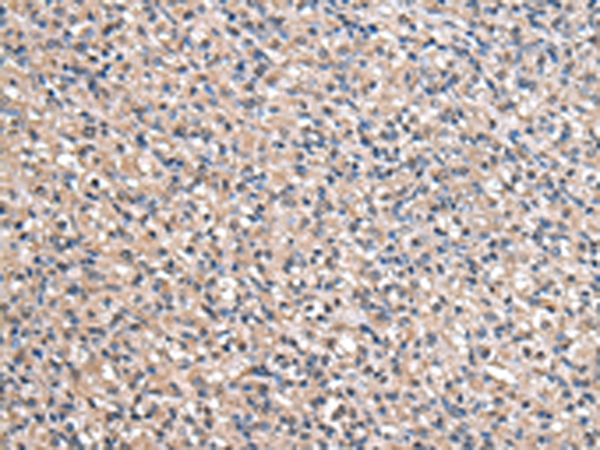

| WB | 咨询技术 | Human,Mouse,Rat |
| IF | 咨询技术 | Human,Mouse,Rat |
| IHC | 1/50-1/200 | Human,Mouse,Rat |
| ICC | 技术咨询 | Human,Mouse,Rat |
| FCM | 咨询技术 | Human,Mouse,Rat |
| Elisa | 咨询技术 | Human,Mouse,Rat |
| Aliases | ACS; ACSA; ACAS2; ACECS; dJ1161H23.1 |
| Entrez GeneID | 55902; |
| WB Predicted band size | 79kDa |
| Host/Isotype | Rabbit IgG |
| Antibody Type | Primary antibody |
| Storage | Store at 4°C short term. Aliquot and store at -20°C long term. Avoid freeze/thaw cycles. |
| Species Reactivity | Human |
| Immunogen | Fusion protein of human ACSS2 |
| Formulation | Purified antibody in PBS with 0.05% sodium azide. |
+ +
以下是关于ACSS2抗体的3篇参考文献的简要信息,涵盖其在癌症代谢和分子机制中的研究应用:
---
1. **标题**:*ACSS2 promotes systemic fat storage through de novo lipogenesis in hepatic metastasis of cancer*
**作者**:Comerford SA et al.
**摘要**:该研究利用ACSS2特异性抗体(Western blot和免疫组化)验证其在肝癌转移模型中的表达,发现ACSS2通过脂肪酸合成通路促进肿瘤细胞的脂质蓄积,为代谢治疗提供新靶点。
---
2. **标题**:*Acetate dependence of tumors*
**作者**:Schug ZT et al.
**摘要**:研究通过ACSS2抗体检测癌细胞中ACSS2蛋白水平,证明其介导乙酸代谢以支持肿瘤生长,尤其在低氧微环境下,敲低ACSS2显著抑制肿瘤增殖。
---
3. **标题**:*ACSS2-mediated acetyl-CoA synthesis from acetate is necessary for human cardiac fibroblast differentiation*
**作者**:Sakamoto A et al.
**摘要**:利用ACSS2抗体(免疫荧光和Western blot)揭示其在心脏成纤维细胞分化中的关键作用,表明ACSS2通过调控组蛋白乙酰化影响细胞表型转化。
---
如需具体文献来源或补充DOI信息,可进一步提供数据库检索支持。
The ACSS2 (acyl-CoA synthetase short-chain family member 2) antibody is a tool used to study the ACSS2 enzyme, which plays a critical role in cellular metabolism. ACSS2 catalyzes the conversion of acetate into acetyl-CoA, a key substrate for lipid synthesis, energy production, and protein acetylation. This enzyme is particularly important under low-glucose conditions, where acetate serves as an alternative carbon source. ACSS2 is expressed in various tissues, including the liver, brain, and adipose tissue, and is localized in both the cytoplasm and nucleus. Nuclear ACSS2 facilitates histone acetylation by generating acetyl-CoA, thereby influencing gene expression and epigenetic regulation.
Research highlights ACSS2's involvement in cancer progression, as many tumors rely on acetate metabolism for growth under metabolic stress. The ACSS2 antibody enables detection and quantification of ACSS2 protein levels in experimental models, aiding studies on metabolic adaptation, tumor biology, and epigenetic mechanisms. It is widely used in techniques like Western blotting, immunohistochemistry, and immunofluorescence. Dysregulation of ACSS2 has also been linked to neurological disorders and metabolic syndromes, making the antibody valuable for exploring therapeutic targets. Its specificity and reliability are critical for elucidating ACSS2's dual metabolic and epigenetic roles in health and disease.
×